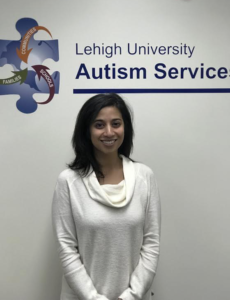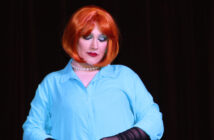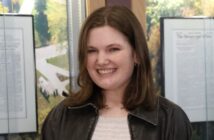
Noor Syed, a professor of practice, is the clinical director of Autism Services at Lehigh. Syed was previously an assistant professor of special education at Manhattanville College. (Olivia Howell/B&W Staff)
As an intern at the Institute for Child Development at SUNY Binghamton, Noor Syed sat down with a child diagnosed with autism. Syed said the child was a big kid who scared others because he had a tendency to engage in aggressive behavior.
Syed, now the clinical director of Lehigh’s Autism Clinic, pointed to the three colors on the table in front of them and asked the child to point to the color red.
The child looked down, scanned the field, pointed to the correct color and looked back up at Syed — he knew he had gotten it right.
“Yes! You did it, that is red!” Syed shouted, proud of the task that was undoubtedly difficult for the child.
Though she was only a junior in college, Syed knew this work was her calling.
“That was the pivotal moment,” Syed said. “Seeing that connection that he had made and being able to be that person to deliver that praise, and seeing how happy it made him.”
As a daughter of a Pakistani man and a Filipino woman, Syed is first-generation in the United States. The concept of special needs is not spoken about as much in the countries where her parents are from. Her cousin from Pakistan had a developmental disability, but Syed was always told that he was “dropped on his head” as a child.
Unfortunately, after getting experimental brain surgery in the U.S that proved ineffective, her cousin was no longer the same.
“After that experiment, he lost some language,” Syed said. “He used to look up when I came into the room and I have memories of us laughing together and watching television together when I was a kid. After the operation, any skills that he had were gone and that was really heartbreaking to see.”
As Syed grew up and became more familiar with her cousin’s disability, she became motivated to get involved in special education and to help individuals and families affected by developmental disorders.
After graduating magna cum laude from Binghamton, Syed went on to complete her doctoral dissertation at Teachers College, Columbia University and became a board-certified behavior analyst-doctoral, licensed behavior analyst and a New York state-certified general and special education teacher, for students through the sixth grade.
Syed was working as an assistant professor of special education at Manhattanville College when a close colleague of hers mentioned that Lee Kern, a professor and the director of the Center for Promoting Research to Practice at Lehigh, was planning to open an autism clinic and was on the search for a clinical director.
Through that connection, Syed and Kern began corresponding and Syed decided to come up to see the clinic before ultimately making the move.
Kern said Syed was more than a perfect fit for the position.
“We interviewed quite a few people but she was by far the most competent, having a lot of great experience and knowledge about working with children with autism,” Kern said. “We were really fortunate to be able to attract her to Lehigh.”
Elise Settanni Brown, a first-year graduate assistant in the clinic, said Syed has been instrumental in helping her build up confidence in her own decision-making throughout her journey of becoming a behavior analyst.
“She’s very insightful and is an amazing mentor in this process of learning how to be a behavior analyst,” Brown said. “She’s really been phenomenal in being able to bring about that critical thinking in myself and other students in the ABA program and helping us feel that sense of confidence that we can do it.”
In addition to serving as clinical director at the Lehigh Autism Clinic, which opened this July, Syed also teaches an intensive practicum course on applied behavioral analysis for graduate students.
Syed said her favorite part about her work is definitely interacting with the children in the clinic.
“There’s that special something about being on the floor with the kids and tickling them and having them ask for things in language, which can be very difficult for a lot of them,” Syed said. “I love being able to work with the kids, I adore it.”





Comment policy
Comments posted to The Brown and White website are reviewed by a moderator before being approved. Incendiary speech or harassing language, including comments targeted at individuals, may be deemed unacceptable and not published. Spam and other soliciting will also be declined.
The Brown and White also reserves the right to not publish entirely anonymous comments.